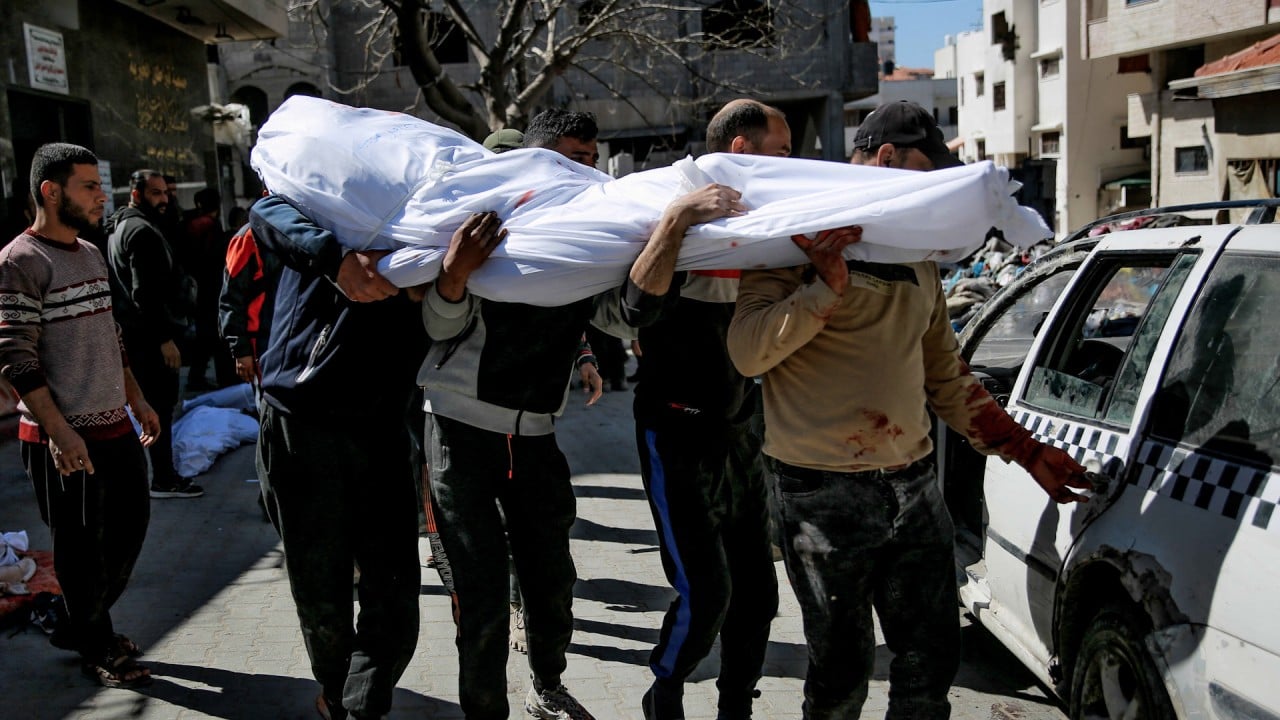Known and revered in Judaism as Temple Mount, the compound in East Jerusalem is also believed to be the site of the biblical Solomon’s Temple.
During the recent negotiations, Hamas made any further release of the scores of hostages kidnapped during its unprecedented attack on southern Israel on October 7 conditional upon an Israeli commitment to end hostilities in Gaza and withdraw its forces.
Israel denies Palestinian claim forces killed Gazans awaiting aid
Israel denies Palestinian claim forces killed Gazans awaiting aid
In the months since the attack, Israel’s air, sea and ground assault on Gaza has killed more than 31,000 people and wounded over 71,500, according to the enclave’s Hamas-run health authorities.
‘Not near a deal’
Israel has rejected Hamas’ demands for a permanent ceasefire, proposing instead a phased six-week truce for further exchanges of hostages and prisoners. But even this appears to have come to nothing after the Palestinian militant group refused to provide a list of living hostages and Israel responded by pulling its delegates from the most recent round of talks in Cairo, leaving talks at an impasse.
“We are not near a deal, meaning that we are not seeing both sides converging on language that can resolve the current disagreement over the implementation of a deal,” Qatar’s foreign ministry spokesman Majed Al-Ansari told a news conference in Doha on Tuesday.
All parties were “continuing to work in the negotiations to reach a deal hopefully within the confines of Ramadan”, he said, adding he could not “offer any timeline” because the situation in Gaza remained “very complicated on the ground”.
In the absence of a temporary Ramadan truce, “the biggest risk is for events to spiral out of control in an unplanned manner, potentially being triggered by actions in Jerusalem,” said William Wechsler, a former US deputy assistant secretary of defence.
The biggest risk is for events to spiral out of control in an unplanned manner, potentially being triggered by actions in Jerusalem
“Otherwise, neither Israel nor Iran nor Iranian proxies like Hezbollah and certain key militias in Iraq will seek to intentionally start a wider regional war,” he told This Week In Asia.
The “one exception is in Yemen”, where the Houthi militia “will continue their attacks on completely innocent and unrelated ships until they lose the capability to do so”, he said.
Under intense US pressure, Israeli Prime Minister Benjamin Netanyahu overruled attempts by Israel’s extremist national security minister, Itamar Ben-Gvir, to tighten restrictions on the age and number of Muslims who could pray in the Al-Aqsa Mosque compound during Ramadan.
Scuffles did break out near the compound on Monday after police crowded Muslims seeking to enter, but the scene was calmer by the following day.
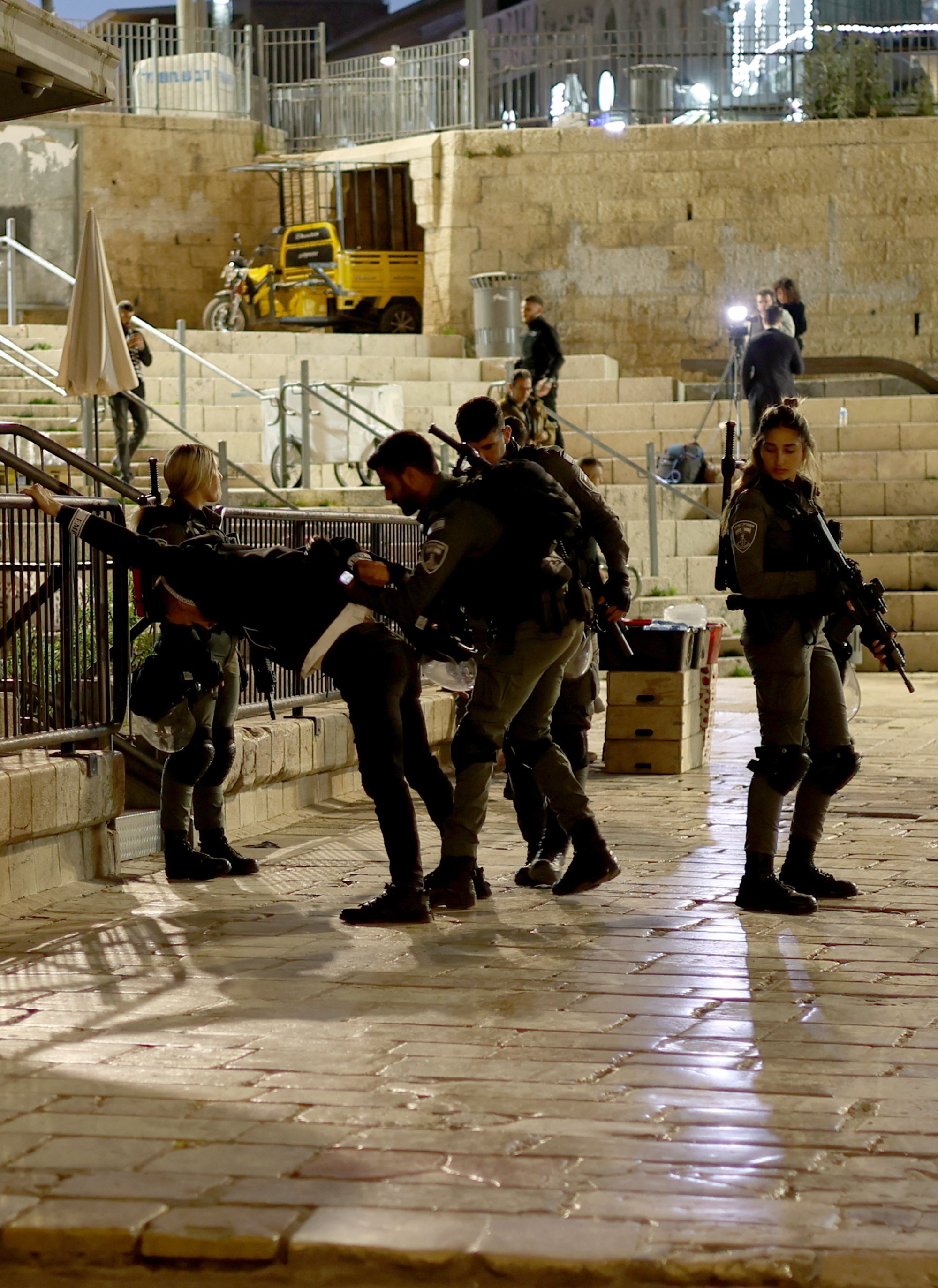
Both Ben-Gvir and finance minister Bezalel Smotrich are known far-right extremists who in previous decades were convicted by Israeli courts of inciting violence against Palestinians and supporting Jewish terrorist groups.
They are key partners in Netanyahu’s Likud party-led coalition government that was formed in December 2021, and could cause it to collapse if their parties withdrew their support.
Since taking office, the two men have piloted approvals for more than 18,000 new homes in illegal Israeli settlements in the occupied West Bank, including 3,400 given the green light on March 6.
Smotrich has also used his position as finance minister to withhold much of the revenue that Israel collects on behalf of the Palestinian Authority, rendering it unable to pay the full salaries of civil servants, including security personnel responsible for policing areas of the West Bank it administers.
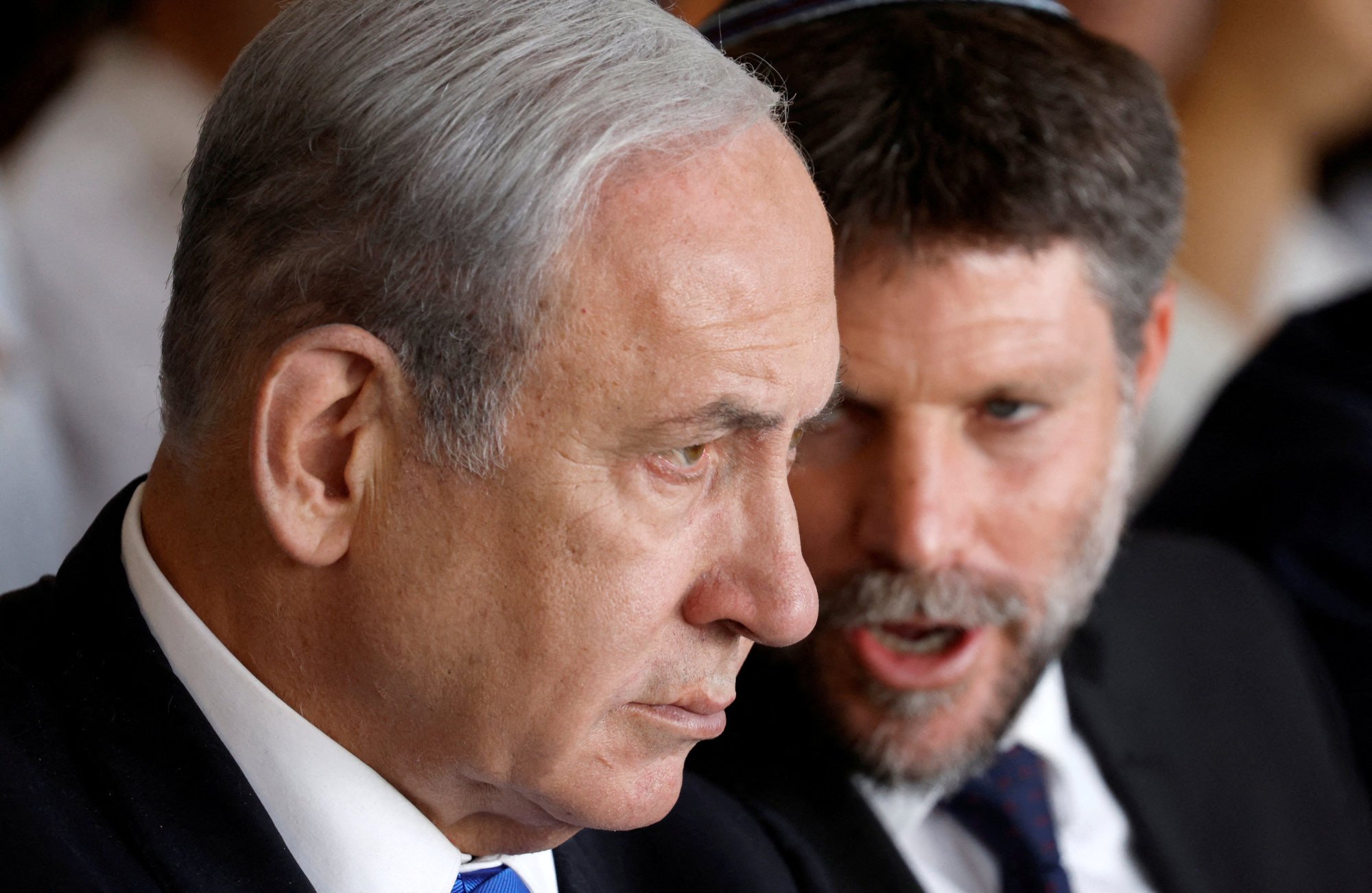
The authority is controlled by the Fatah faction of the Palestinian Liberation Organisation, a deadly rival of Hamas that accepted the legitimacy of the Israeli state under the US-mediated Oslo Peace Accords agreed in 1993 and 1995.
Roughly 150,000 Palestinians who worked in Israel before the war have been prevented from entering the country in the months since it began, pushing up the rate of unemployment in the West Bank to 29 per cent from 13 per cent.
At the same time, Israeli security forces have been cracking down on militants and their supporters in the West Bank, launching regular raids on towns and refugee camps in the territory – leading to the deaths of more than 400 Palestinians and the detentions of over 3,300 since December.
Despite this, armed Palestinian groups have continued to grow in strength, and have reportedly received weapons smuggled through neighbouring Jordan by Hamas and its allies in the Iran-aligned “Axis of Resistance”.
Israeli settlements in Palestinian territories amount to ‘war crime’: UN
Israeli settlements in Palestinian territories amount to ‘war crime’: UN
But most Palestinians in the West Bank have “stayed on the fence so far and refrained from violence”, said Neomi Neumann, a former head of research at both the Israel Security Agency, or Shin Bet, and the ministry of foreign affairs.
“Yet the situation on the ground has grown increasingly fragile for months, and the wrong spark during Ramadan” could turn the West Bank into a third front for Israel – alongside Gaza and against Hezbollah in Lebanon – she wrote in a paper published on March 4 by the Washington Institute for Near East Policy.
“The West Bank is increasingly dangerous,” agreed Wechsler, who now works as senior director at the Rafik Hariri Centre and for the Middle East programmes of the Atlantic Council, a Washington-based think tank.
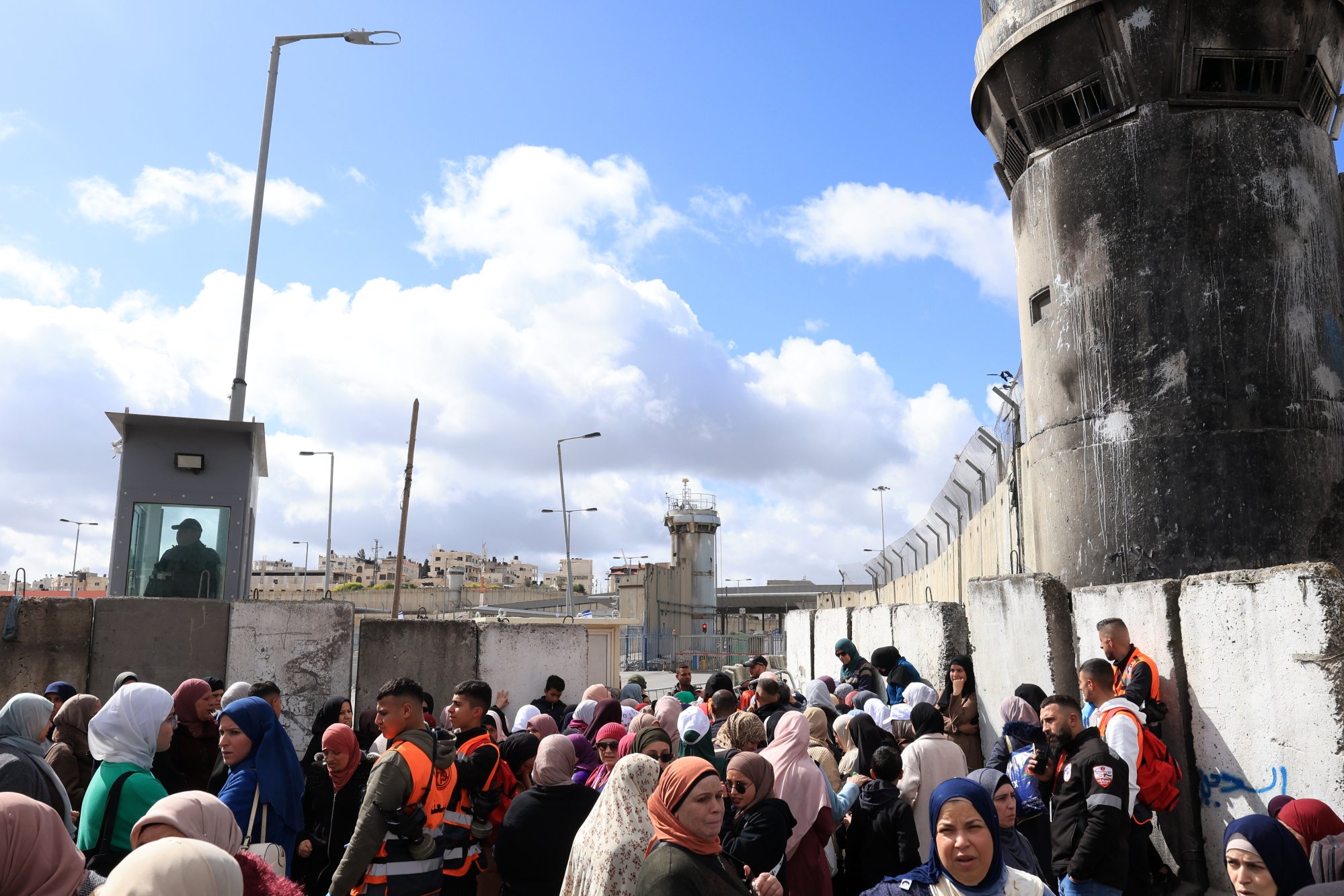
He said the Palestinian Authority had “proved incapable of projecting its authority” into all of the areas under its nominal control, “with Hamas or Hamas-adjacent groups taking over in places, requiring an Israeli response”.
Extremist and increasingly violent Israeli settlers were also “taking advantage of the context provided by the war to increase their provocations and violence”, he said.
“If the war continues actively throughout Ramadan, we should anticipate a high likelihood of rising violence in the West Bank,” Wechsler said.
Life and death in Gaza
In Gaza, many of the thousands of Palestinian deaths have included entire families killed when their homes were hit by Israeli bombs.
Among them were more than 50 members of the extended family of Ahmed Abu Safia, a senior executive of Dubai-based ports and free zones operator DP World.
He and his wife are both the offspring of Palestinians who were forced to seek refuge in Gaza after being forced out of their homes in 1948 during the mass forced displacement of people by armed Jewish settlers known as the ‘Nakba’.
While Ahmed’s parents migrated to the United Arab Emirates in the 1970s, the rest of their family and that of his Gaza born-and-bred wife remained there.
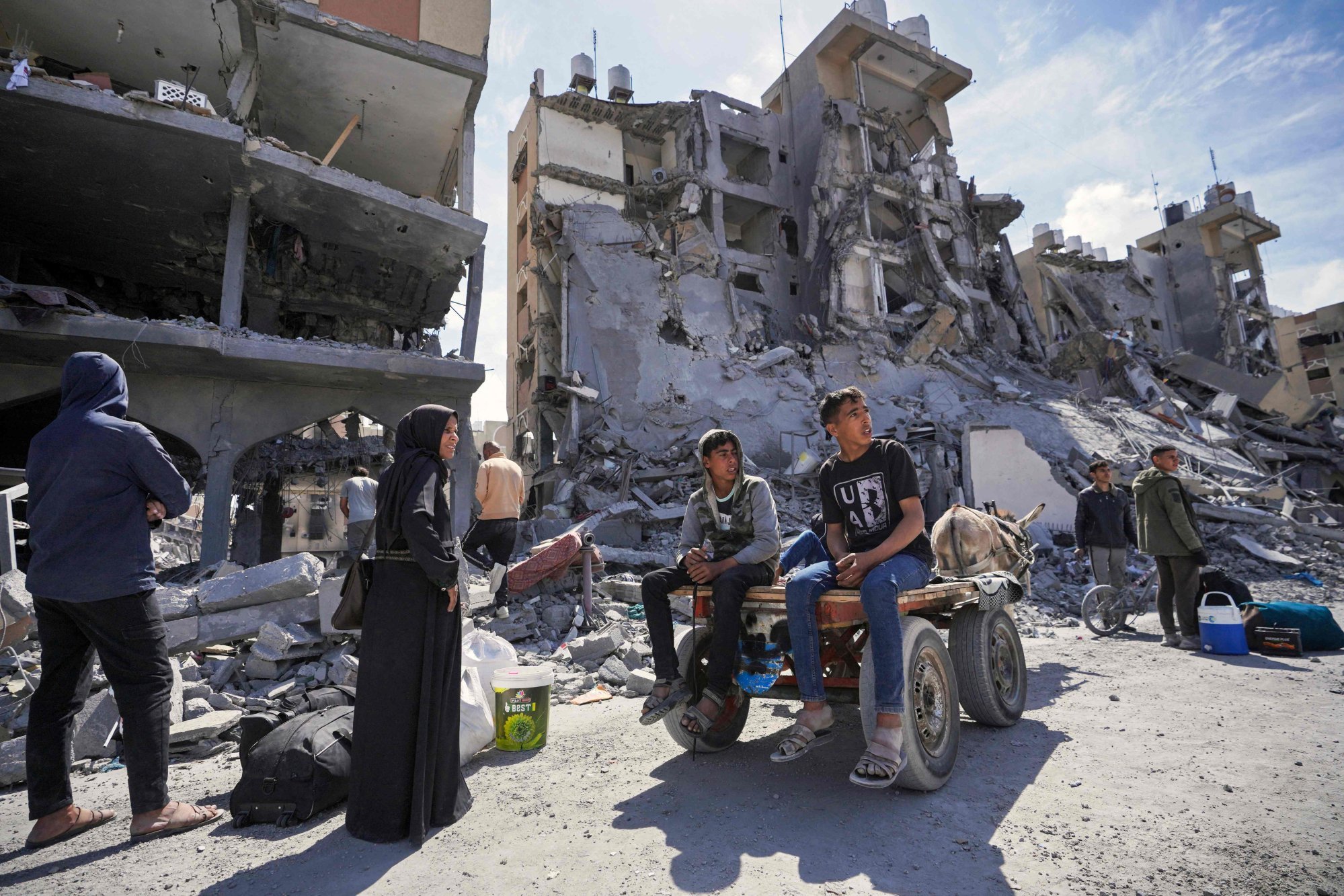
Recent events in Gaza “have really affected us on many levels”, he told This Week In Asia on Wednesday.
“We have lost more than 50 family members – first cousins and second cousins,” said Ahmed, who added that he and his wife “don’t know anything” about many other relatives they have lost contact with.
“We are trying to stay in touch with my father-in-law, my wife’s siblings, my uncles and aunts, but it has been really really tough and difficult to communicate with many of them,” he said, adding that calls and texts often don’t get through for days at a time.
Ahmed visited his relatives in Gaza in October 2022, a year before the Hamas attack.
“It was a very, very tough journey to get to Gaza and to get out of Gaza, and to witness some of the daily sufferings that Palestinians were going through,” he said.
“I actually told my wife: I think something will happen soon,” he said, because the lack of “a future for many people of Gaza is just unsustainable”, referring to the absence of opportunities for young people and high levels of unemployment.
When Israel launched its military operation in Gaza, Ahmed’s relatives living in the northern refugee camp at Jabilia were in the firing line.
Initially, they were reluctant to heed Israeli warnings to evacuate because they thought military operations would be limited, as had been the case during escalations in previous decades.
Every night, they would say goodbye to each other as if it was their last night
Their minds changed, however, after the home of a relative was hit by an Israeli air strike. Ahmed’s second cousin, his wife, children and grandchildren – 22 people in total – all died.
Ahmed’s immediate family grabbed whatever they could carry and sought safety in the Nuseirat refugee camp in central Gaza, where relatives had offered to accommodate them.
While they were there, Ahmed tried his best to send financial assistance, but found it “really, really difficult to send anything to Gaza”. Even if he had succeeded, he said his relatives wouldn’t have been able to do “anything with it because there is nothing to buy”.
One bag of flour that used to cost 200 Israeli shekels (US$55) is now 10 times that price, or more, if it’s available at all.
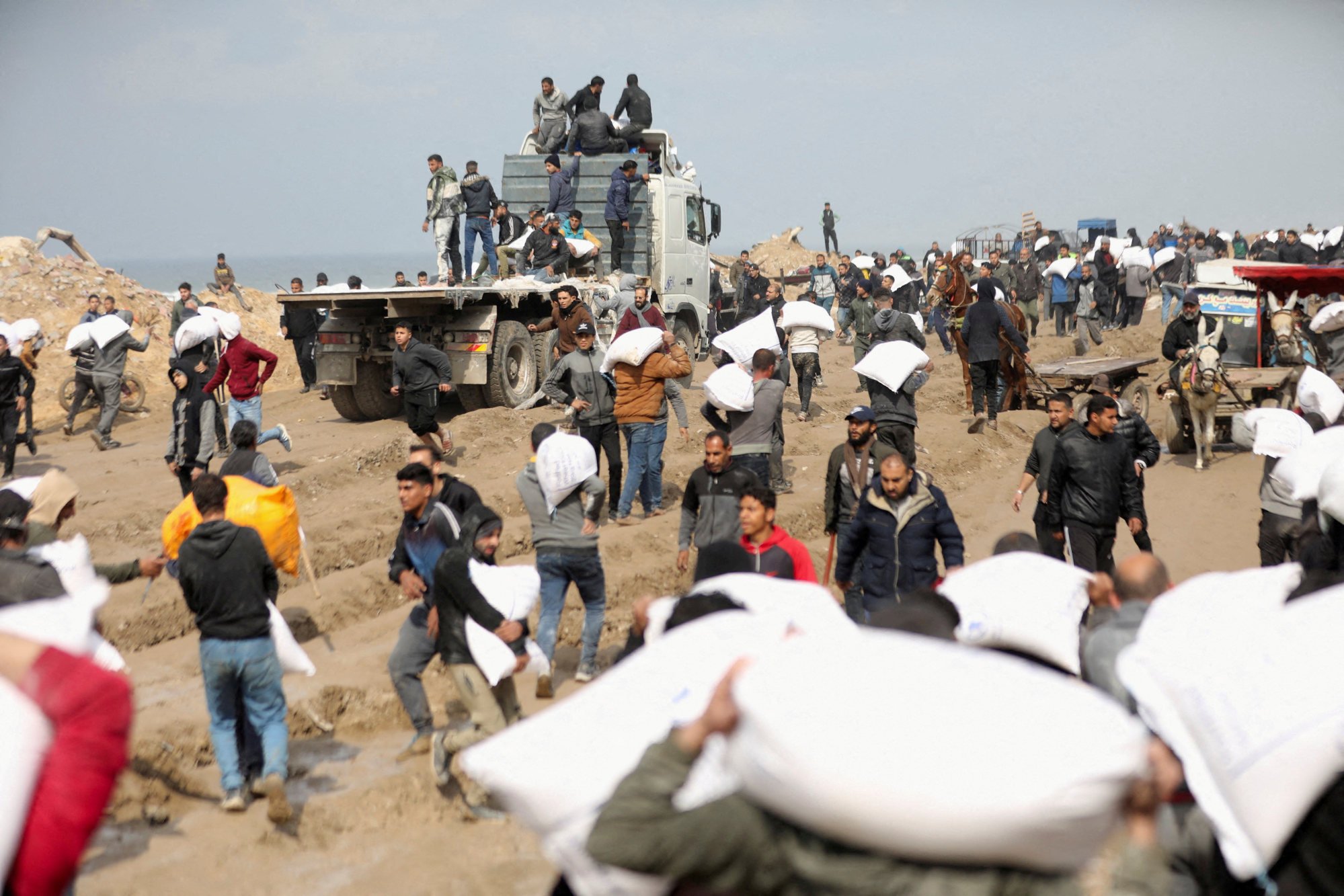
While in Nuseirat, Ahmed’s family started sleeping in their clothes because they did not want their bodies to be found in a state of undress if they were killed in an Israeli air strike.
“Every night, they would say goodbye to each other as if it was their last night,” he said.
It wasn’t long before the Israeli military dropped fliers on Nuseirat, advising people to move further south to Rafah.
The bombings around Ahmed’s loved ones soon intensified, hitting the house next door and shattering the windows of the house they were staying in.
‘Living hell’ in the ruins of al-Shifa, Gaza’s largest hospital
‘Living hell’ in the ruins of al-Shifa, Gaza’s largest hospital
They fled to Rafah, where there was nobody to take them in, and spent US$300 on a tent pilfered from humanitarian aid donated by the UAE, which they erected along the border wall with Egypt.
Their access to food is limited, Ahmed said, and they often go for several days at a time with nothing to eat.
His father-in-law has no medicine for his diabetes and high blood pressure, while his brother-in-law has been unable to obtain medical treatment from Gaza’s barely functioning healthcare system.
Meanwhile, one of his sisters-in-law is pregnant and close to giving birth. Without hospitals, “we really don’t know where and how she’s going to deliver”, Ahmed said.
“They might end up going back to the old ways, bringing ladies to help her to deliver in the tent that she’s staying in,” he said.
Crossing red lines
Against the backdrop of the unfolding humanitarian crisis, Biden said in an interview with MSNBC on March 9 that Israel “cannot have 30,000 more Palestinians dead” as a consequence of going after Hamas militants, amid rising tensions with Netanyahu over the latter’s plans to launch a military assault on Rafah.
Israel says it has killed more than 13,000 Hamas militants. Netanyahu, in an interview with Germany’s Axel Springer media group on March 10, estimated the ratio of civilian deaths to combatant deaths was 1 to 1.5.
Israel has blamed Hamas for the thousands of civilian casualties, claiming that the militant group uses Palestinians as “human shields” because it operates against Israeli forces from within populated areas.
Biden has said an Israeli invasion of Rafah would cross a “red line” – although he instantly clarified that it wouldn’t prompt Washington to cut off “all weapons supplies”.
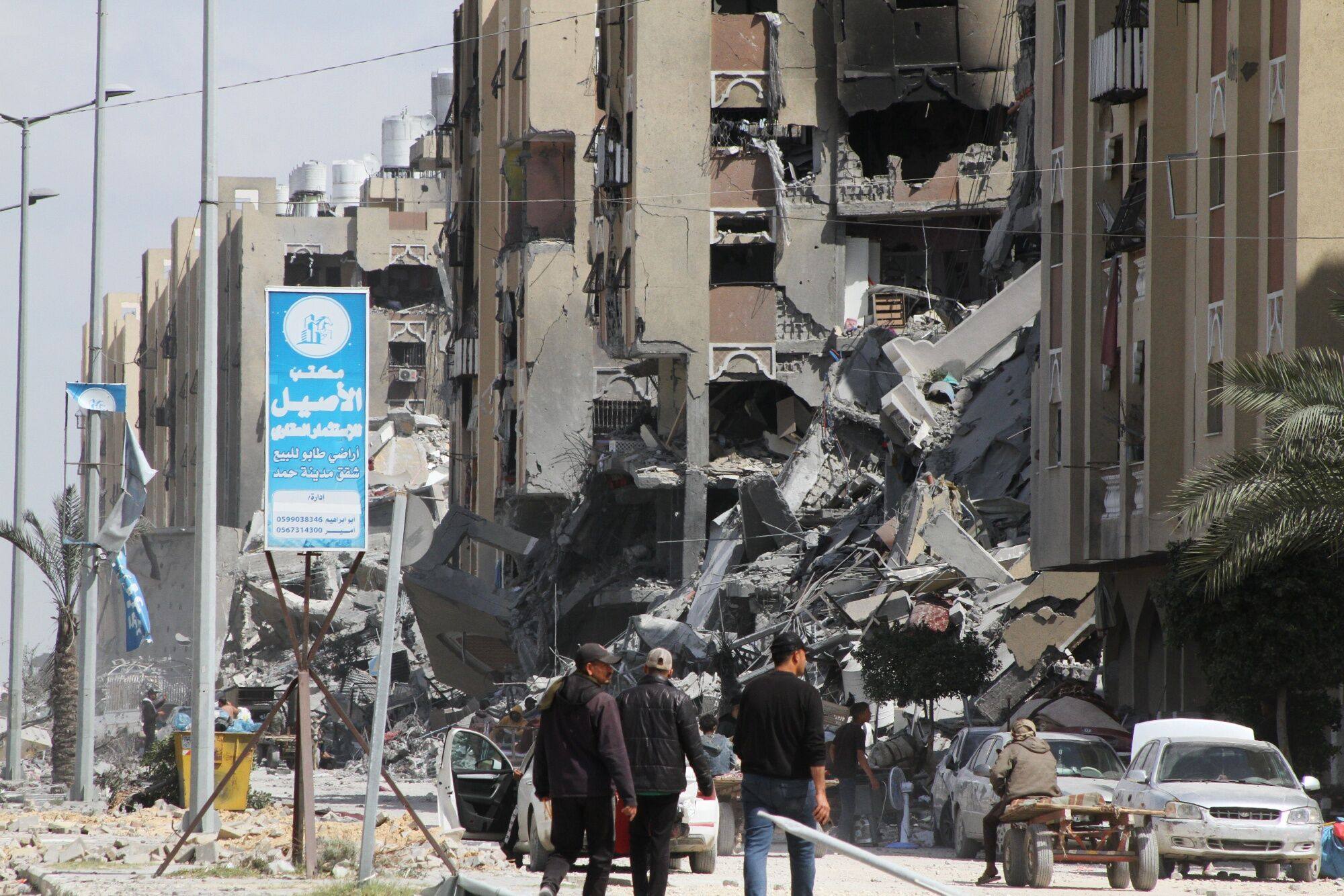
The US has provided US$11 billion in military aid to Israel since the start of the war, including tens of thousands of artillery and tank shells, and several thousand precision-guided bombs.
It has also deployed additional forces, including two aircraft carriers, to the Middle East to deter Hamas’ allies in the Iran-aligned Axis of Resistance, in particular Lebanese Hezbollah.
Biden has said Netanyahu has the right to defend Israel and continue to pursue Hamas, “but he must, he must, he must pay more attention to the innocent lives being lost as a consequence of the actions taken”.
Rafah currently hosts a sea of tents housing 1.4 million people, or more than two-thirds of the total pre-war population of Gaza.
Israel plans to direct Palestinians out of Rafah before offensive
Israel plans to direct Palestinians out of Rafah before offensive
Like Ahmed’s family, most of them are displaced from active war zones in the rest of the strip.
Netanyahu has repeatedly vowed to press ahead with the Israeli offensive, telling Axel Springer: “You know, I have a red line. You know what the red line is? That October 7 doesn’t happen again. Never happens again.”
Clayton Allen, US director of the Eurasia Group, a political risk consultancy based in New York, said Biden was “in a tough spot” after his red line comments.
If an Israeli operation in Rafah moves forward, Biden will “either have to follow through on weapons restrictions [against Israel] – which he clearly does not want to do, and which he would face political backlash for – or do nothing and face backlash from progressives in his Democratic Party”, Allen said.
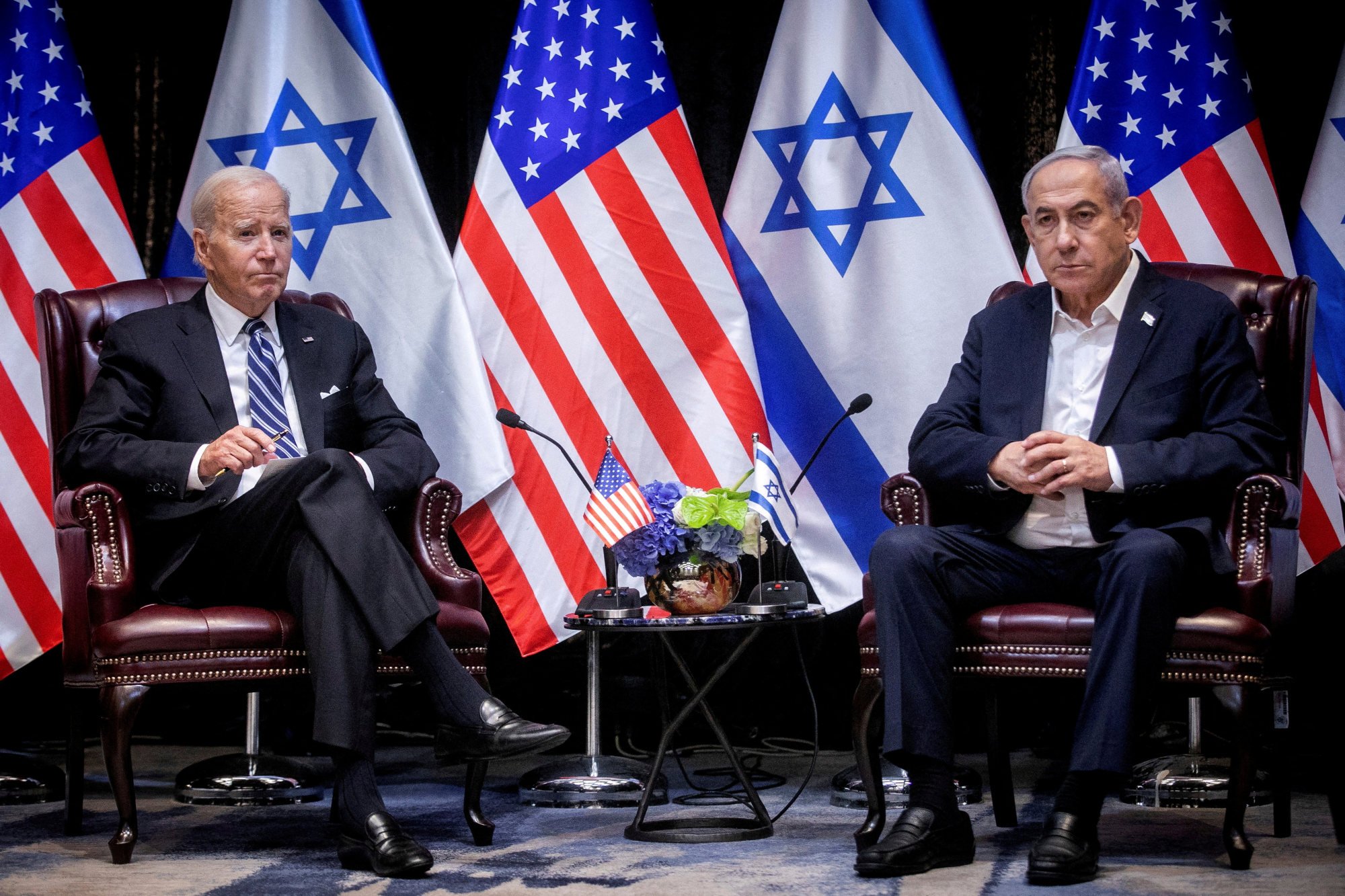
He said additional deterioration in the US-Israel relationship was likely, “as we see Biden painted into a corner at home and Netanyahu largely unchanged in his somewhat antagonistic approach to dealing with Biden”.
Analysts have noted that Israel has yet to begin reinforcing or repositioning its forces in Gaza in preparation for an assault on Rafah, making an attack during Ramadan unlikely.
He described the plan as part of preparations for Israel’s military assault against Hamas’ four remaining battalions and military leadership figures believed to be entrenched in the southern border town.
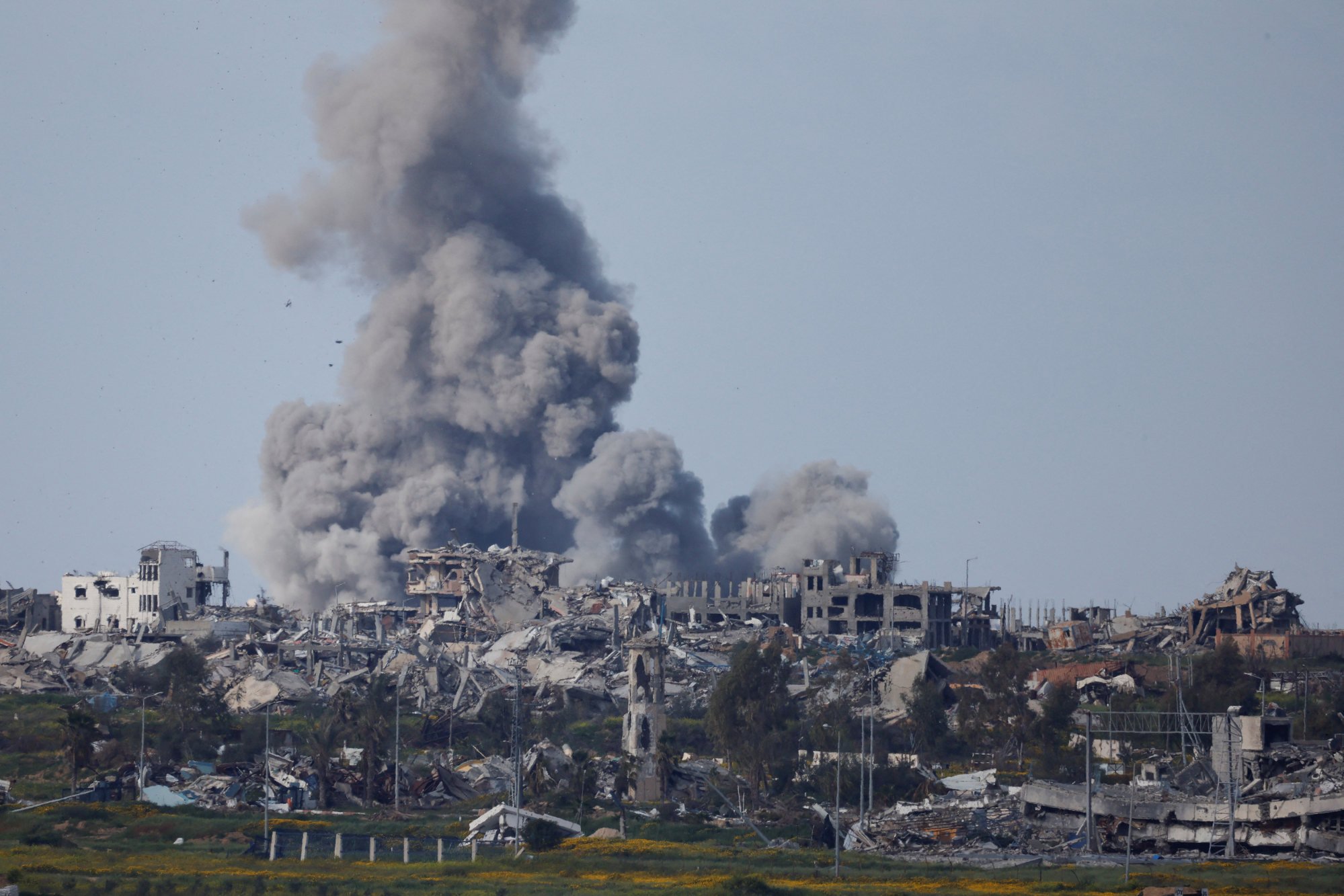
Hagari gave no indication of when the evacuation or military assault would commence.
Later on Wednesday, US Secretary of State Antony Blinken said Washington had yet to receive Israel’s plans for civilians in Rafah.
“We need to see a plan that will get civilians out of harm’s way if there’s a military operation in Rafah. We’ve not yet seen such a plan,” he told reporters in Washington.
On the other hand, Netanyahu has claimed that Israel’s war against Hamas would not “take more than two months” to complete.
“We’ve destroyed three-quarters of Hamas’ fighting terrorism battalions. And we’re close to finishing the last part in warfare,” he told Axel Springer. “Maybe six weeks, maybe four.”
Starvation ‘as a weapon of war’
Allies and critics alike have blamed Israel for the emerging humanitarian disaster, due to the draconian restrictions it has placed on humanitarian aid entering Gaza since the war broke out.
In a speech to the UN Security Council in New York on Tuesday, the EU’s high representative for foreign affairs Josep Borrell Fontelles said Gaza’s population was “fighting for its survival … but it is not a natural disaster”.
He said land crossings into Gaza had been “artificially closed” by the Israeli government, accusing it of using “starvation … as a weapon of war”.

In response to the October attack by Hamas, Israel imposed a siege on Gaza, sealing off all access points and cutting off electricity, water and communications.
Since then, Israel has permitted fewer than 100 truckloads of food, medicine and other essential humanitarian goods to enter from Egypt per day, on average.
Before the war, more than 500 truckloads a day entered Gaza, and aid agencies considered that barely enough to sustain the enclave’s 2.2 million people.
Under a storm of criticism, Israel recently made some small concessions, such as allowing the UN to conduct a trial run of delivering six truckloads of food to northern Gaza via Israeli territory on Monday.
A quarter of Gaza’s population is one step from famine, UN says
A quarter of Gaza’s population is one step from famine, UN says
The UN’s World Food Programme said it was enough to feed one meal to 25,000 people.
According to UN agencies and the Gazan health ministry, the estimated 300,000 Palestinians who remain in the north of Gaza are the most vulnerable to famine.
Since March 4, 25 deaths from malnutrition and dehydration have been reported at two hospitals there.
In all, 179 aid-bearing trucks reached northern Gaza in the first 12 days of March.
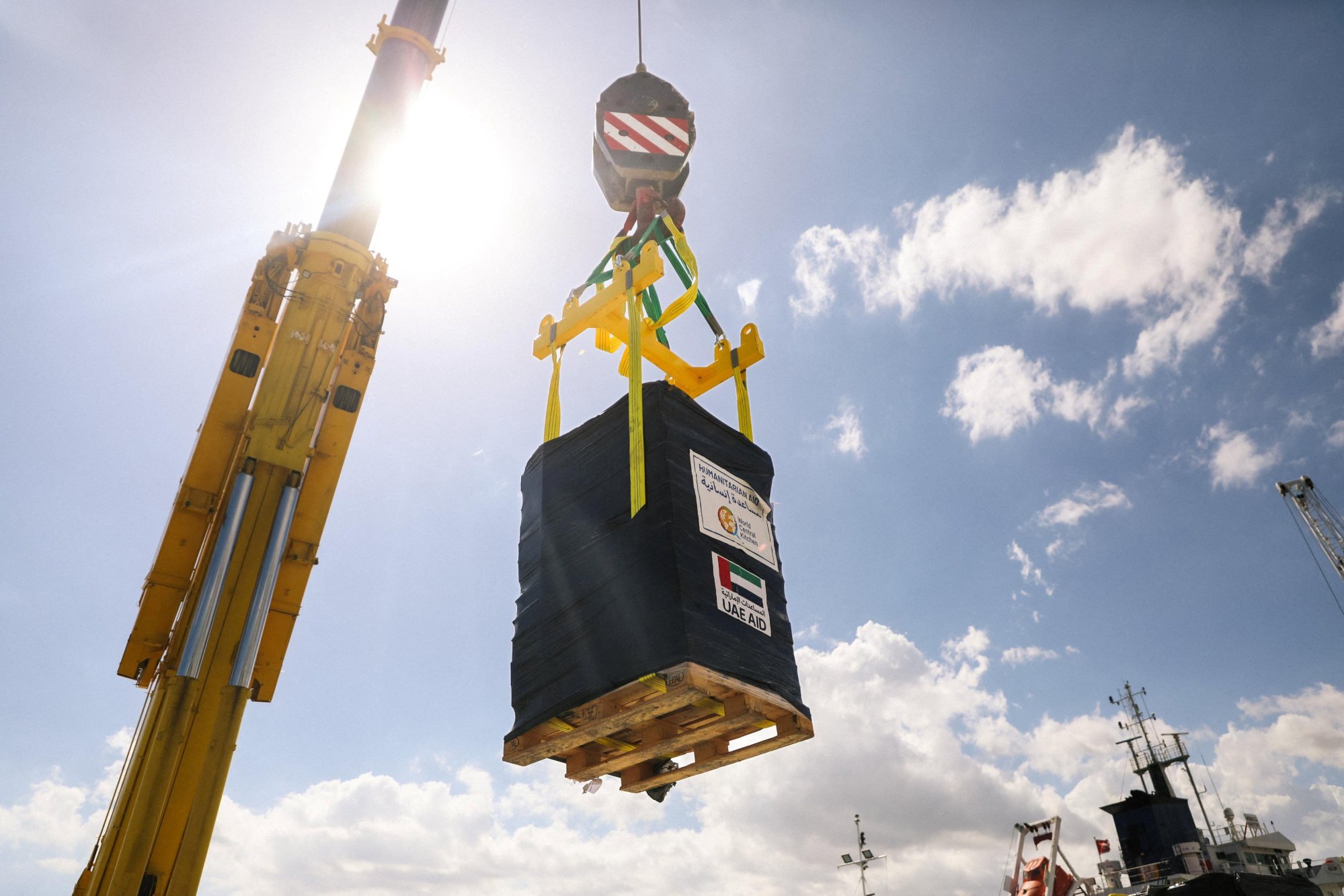
The number of aid trucks Israel allowed into southern Gaza from Egypt also doubled to 200 a day last week.
Meanwhile, Israel has permitted construction to begin on a dock near Gaza City, on the Mediterranean coast in the north of the enclave, for the delivery of aid from Cyprus, some 580km away.
Israel granted approval for the first 200-tonne shipment of aid through the dock on Wednesday.
Challenges loom over US plan for ‘floating pier’ in Gaza
Challenges loom over US plan for ‘floating pier’ in Gaza
Gaza has not had a functioning port since its only one was destroyed by Israel during the Palestinian uprising of 2000-2005 known as the Second Intifada.
“If Israel really wanted to help they could open Ashdod port, which is in Israel,” UK Foreign Secretary David Cameron said in Britain’s House of Lords on Tuesday, “[it] is a fully functioning port that could really maximise the delivery of aid from Cyprus straight into Israel and therefore into Gaza.”


